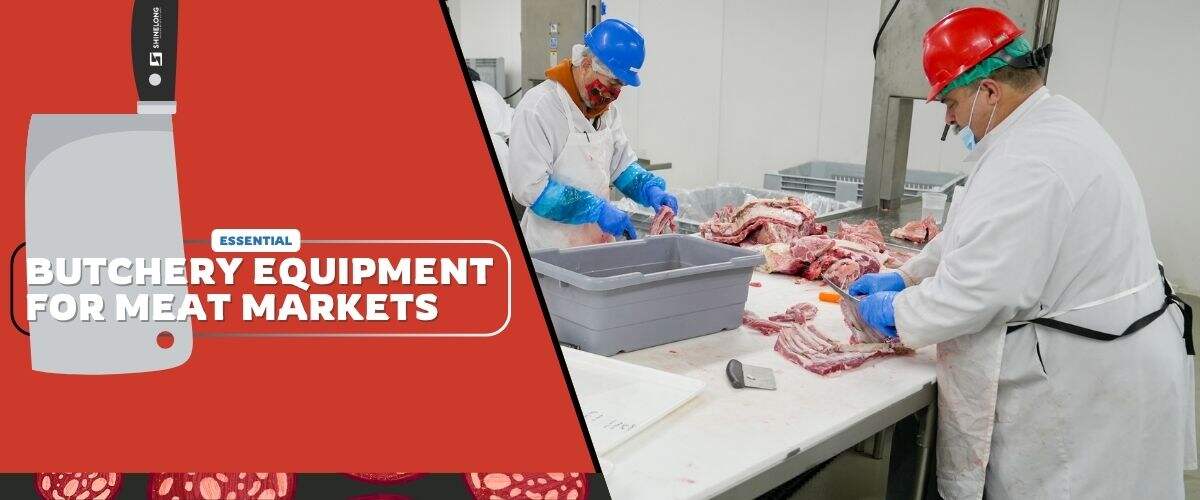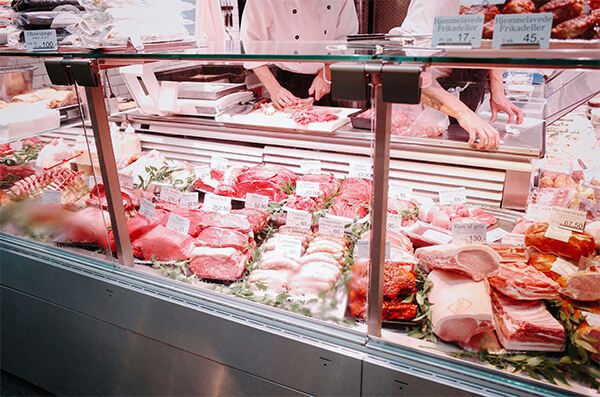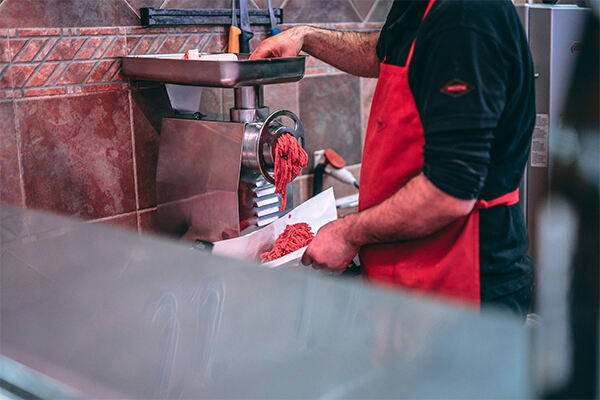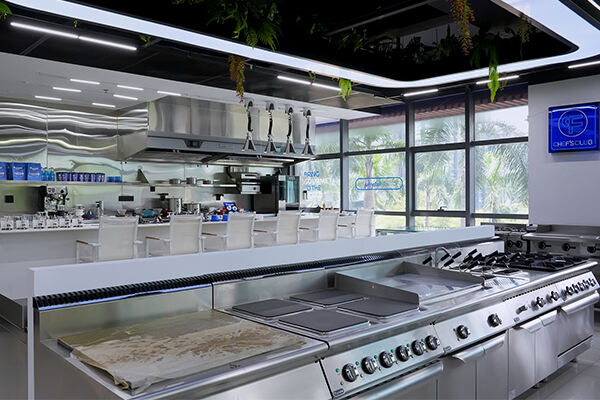News
Essential Butchery Equipment for Meat Markets | Complete Guide

As consumer expectations grow for fresh cuts of meat, related products, and ready-to-cook options, the entire food service industry has significantly changed in recent years. Within the broader food service sector, one standout figure demands attention: the meat market segment has experienced dramatic growth, reaching over $1.3 trillion in 2024.
This surge reflects the rising demand for fresh, organic meat products. The role of butcher shops and wholesale meat processors continues to expand within the commercial kitchen industry. With the steady rise in consumption of fresh meat, there is a massive opportunity for both butchery equipment providers and food processor manufacturers.
In this guide, we’ll provide meat processors and butcher shop operators with an overview of essential butchery kitchen equipment—from stainless steel food processors to meat refrigeration equipment—to help your meat market deliver fresh, organic, and locally sourced meats efficiently and safely.
What Is The Meaning of the Meat Market?
Before we step into the world of butchery equipment, we need to clarify the concept and definition of a meat market. A meat market is a specialized marketplace where various types of raw meat—such as beef, lamb, pork, poultry, or seafood—are processed, portioned, stored, and sold.
The term “meat market” also refers to a meat retail store, a butcher’s shop, or specific areas within a grocery store or supermarket dedicated to meat preparation. A meat market doesn’t just serve individual customers—in wholesale distribution centers or large butcher shops, establishments need to process significant quantities of meat to supply commercial kitchens such as those in restaurants, hotels, or even institutional canteens.
Behind these operations, the butcher kitchen or meat section plays a key role. It is typically equipped with commercial food processors and professional kitchen equipment to support every step of the process—from breaking down primal cuts and trimming to chilling and safe storage.

Why Butchery Equipment Matters for Butcher Shops
In response to the demand for large quantities of raw meat, using commercial-grade butchery equipment is absolutely essential. A butcher’s job involves breaking down animal carcasses into various cuts of meat—including ribs, legs, bellies, or shanks—which is a highly specialized and physically demanding task. Having the right commercial butchery equipment is indispensable for handling this work efficiently and safely.
Let me give you a few examples to explain why butchery equipment matters in butcher shops.
Meat preparation is one of the most critical aspects of any meat market, whether in a traditional butcher shop or a wholesale meat distribution center. Butchers working in these workplaces must process different cuts of meat to meet customer preferences and hygiene standards. Tasks such as filleting, trimming, and chopping are routine—and that’s where equipment like commercial meat grinders and meat slicers can exceedingly enhance efficiency and consistency. To meet food safety standards, stainless steel worktables can't be left without.
But the duty of a meat market is more than cutting. Services like value-added processing, inventory management, and product consistency are equally important. That’s why butcher shops require a variety of kitchen equipment—and in the next section, I’ll walk you through an essential equipment list especially for meat market operations, helping you make the right choices for your business.

Essential Kitchen Equipment List for Butcher Shops
As we all know, cleavers and stainless steel worktables are essential in any butcher shop—but for a modern meat market, that's just the beginning. Today’s butcher shops often serve customers directly, help them choose specific cuts, fulfill custom orders, and even offer value-added processing services. To meet these demands, a comprehensive setup of commercial kitchen equipment is indispensable.
Here’s a completed list of essential commercial-grade equipment for meat markets:
- Stainless Steel Food Processor – An industrial processor ideal for slicing, grinding, or shredding meat into different textures, helping butchers meet diverse customer demands for specific meat preparations.
- Meat Marinator Machine / Vacuum Meat Marinating Machine – Ensures quick, uniform marination of meat cuts, perfect for seasoned or ready-to-cook products.
- Meat Saw / Bone Saw Machine – Delivers clean, precise cuts through bones or frozen meat with minimal waste.
- Meat Grinder – Essential for coarse or fine grinding, ideal for preparing ground beef, sausage mixes, or specialty blends.
- Meat Slicer – Delivers consistent, adjustable slices for deli meats or portion-controlled servings.
- Vacuum Packaging Machine – Extends product shelf life while preserving freshness and hygiene standards.
- Meat Refrigeration Equipment – Includes walk-in cold rooms, display fridges, and under-counter freezers to ensure proper storage and temperature control.
- Stainless Steel Storage Cabinet – Keeps knives, seasonings, and small tools organized, clean, and within reach.
- Mobile Stainless Steel Worktables – Sturdy and movable, these allow for efficient workflow and easy sanitation during meat prep.
- Butcher Block Cutting Tables – Durable, hygienic surfaces designed for intensive chopping, cleaving, and deboning tasks.
- Stainless Steel Trolleys (China Wholesale Options) – Ideal for transporting large quantities of meat safely and efficiently.
- Meat Hooks & Rail Systems – Essential for handling carcasses in larger meat markets or processing facilities.
- Handwashing & Sanitation Stations – Critical for maintaining hygiene compliance in any food-grade processing area.
How to Choose the Right Butcher Kitchen Equipment Supplier
Choosing the right supplier is just as important as choosing the right equipment. Your equipment partner should fully understand the operational demands of a modern butcher shop or meat market, and be able to provide:
- Food-Grade Stainless Steel Fabrication – Ensuring hygiene, durability, and compliance with food safety standards.
- Customized and Modern Butcher Kitchen Layouts – Designed to streamline workflow, enhance safety, and maximize space efficiency.
- Reliable Meat Marinating Machine Suppliers – Supporting consistent quality in value-added meat processing.
- Responsive After-Sales Service – Fast, dependable support when it matters most.
At Shinelong, we’re dedicated to offering one-stop commercial kitchen solutions for meat processing businesses, butcher kitchens, and all types of foodservice establishments. As one of the leading China food processor manufacturers, we provide global clients with customized equipment solutions—whether you’re operating a traditional butcher shop or a wholesale meat market centre.
FAQs
- Q: Why do people prefer buying meat from a meat shop?
A: Because butcher shops offer fresher, custom-cut meat and expert help.
- Q: What does butcher mean?
A: A butcher is a professional who processes, cuts, trims, and prepares meat for sale.
- Q: What is the definition of a butcher shop?
A: A butcher shop is a specialized meat retail store where fresh cuts are prepared and sold directly to customers. - Q: What equipment is essential in a butcher kitchen?
A: Indispensable equipment includes meat slicers, bone saws, meat grinders, and stainless steel food processors.
- Q: How is a meat market different from a supermarket meat section?
A: Meat markets focus on meat products, offering a wider variety and fresher processing than general grocery stores.
- Q: Why choose stainless steel fabrication in meat processing equipment?
A: Because food-grade stainless steel resists corrosion, ensures hygiene, and meets commercial kitchen safety standards.
- Q: Can I customize my butcher kitchen layout?
A: Yes, professional suppliers offer custom butcher kitchen designs to match workflow and space requirements. At Shinelong we can offer a tailored kitchen solution for your commercial kitchen operations, from kitchen design to equipment supply.
- Q: What services should a meat processing equipment supplier provide?
A: Look for suppliers who offer one-stop kitchen solutions, equipment customization, and responsive after-sales support.
 After-Sales:
After-Sales:
 EN
EN
 AR
AR
 HR
HR
 NL
NL
 FI
FI
 FR
FR
 DE
DE
 EL
EL
 HI
HI
 IT
IT
 PT
PT
 RO
RO
 RU
RU
 ES
ES
 TL
TL
 ID
ID
 SL
SL
 VI
VI
 ET
ET
 MT
MT
 TH
TH
 FA
FA
 AF
AF
 MS
MS
 IS
IS
 MK
MK
 HY
HY
 AZ
AZ
 KA
KA
 UR
UR
 BN
BN
 BS
BS
 KM
KM
 LO
LO
 LA
LA
 MN
MN
 NE
NE
 MY
MY
 UZ
UZ
 KU
KU










